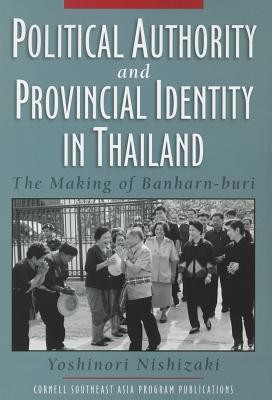
- We will send in 10–14 business days.
- Author: Yoshinori Nishizaki
- Publisher: Cornell University Press
- ISBN-10: 0877277532
- ISBN-13: 9780877277538
- Format: 18 x 25.7 x 2.8 cm, minkšti viršeliai
- Language: English
- SAVE -10% with code: EXTRA
Political Authority and Provincial Identity in Thailand (e-book) (used book) | bookbook.eu
Reviews
Description
The powerful Thai politician Banharn Silpa-archa has been disparaged as a corrupt operator who for years channeled excessive state funds into developing his own rural province. This book reinterprets Banharm's career and offers a detailed portrait of the voters who support him. Relying on extensive interviews, the author shows how Banharm's constituents have developed a strong provincial identity based on their pride in his advancement of their province, Suphanburi, which many now call "Banharm-buri," the place of Banharm. Yoshinori Nishizaki's analysis challenges simplistic perceptions of rural Thai voters and raises vital questions about contemporary democracy in Thailand.
Yoshinori Nishizaki's close and thorough examination of the numerous public construction projects sponsored and even personally funded by Banharn clearly illustrates this politician's canny abilities and tireless, meticulous oversight of his domain. Banharn's constituents are aware that Suphanburi was long considered a "backward" province by other Thais--notably the Bangkok elite. Suphanburians hold the neglectful central government responsible for their province's former sorry condition and humiliating reputation. Banharn has successfully identified himself as the antithesis to the inefficient central state by promoting rapid "development" and advertising his own role in that development through well-publicized donations, public ceremonies, and visits to the sites of new buildings and highways.
Much standard literature on rural politics and society in Thailand and other democratizing countries in Southeast Asia would categorize this politician as a typical "strongman," the boss of a semiviolent patronage network that squeezes votes out of the people. That standard analysis would utterly fail to recognize and understand the grassroots realities of Suphanburi that Nishizaki has captured in his study. This compassionate, well-grounded analysis challenges simplistic perceptions of rural Thai voters and raises vital questions about contemporary democracy in Thailand.
EXTRA 10 % discount with code: EXTRA
The promotion ends in 23d.07:39:54
The discount code is valid when purchasing from 10 €. Discounts do not stack.
- Author: Yoshinori Nishizaki
- Publisher: Cornell University Press
- ISBN-10: 0877277532
- ISBN-13: 9780877277538
- Format: 18 x 25.7 x 2.8 cm, minkšti viršeliai
- Language: English English
The powerful Thai politician Banharn Silpa-archa has been disparaged as a corrupt operator who for years channeled excessive state funds into developing his own rural province. This book reinterprets Banharm's career and offers a detailed portrait of the voters who support him. Relying on extensive interviews, the author shows how Banharm's constituents have developed a strong provincial identity based on their pride in his advancement of their province, Suphanburi, which many now call "Banharm-buri," the place of Banharm. Yoshinori Nishizaki's analysis challenges simplistic perceptions of rural Thai voters and raises vital questions about contemporary democracy in Thailand.
Yoshinori Nishizaki's close and thorough examination of the numerous public construction projects sponsored and even personally funded by Banharn clearly illustrates this politician's canny abilities and tireless, meticulous oversight of his domain. Banharn's constituents are aware that Suphanburi was long considered a "backward" province by other Thais--notably the Bangkok elite. Suphanburians hold the neglectful central government responsible for their province's former sorry condition and humiliating reputation. Banharn has successfully identified himself as the antithesis to the inefficient central state by promoting rapid "development" and advertising his own role in that development through well-publicized donations, public ceremonies, and visits to the sites of new buildings and highways.
Much standard literature on rural politics and society in Thailand and other democratizing countries in Southeast Asia would categorize this politician as a typical "strongman," the boss of a semiviolent patronage network that squeezes votes out of the people. That standard analysis would utterly fail to recognize and understand the grassroots realities of Suphanburi that Nishizaki has captured in his study. This compassionate, well-grounded analysis challenges simplistic perceptions of rural Thai voters and raises vital questions about contemporary democracy in Thailand.


Reviews